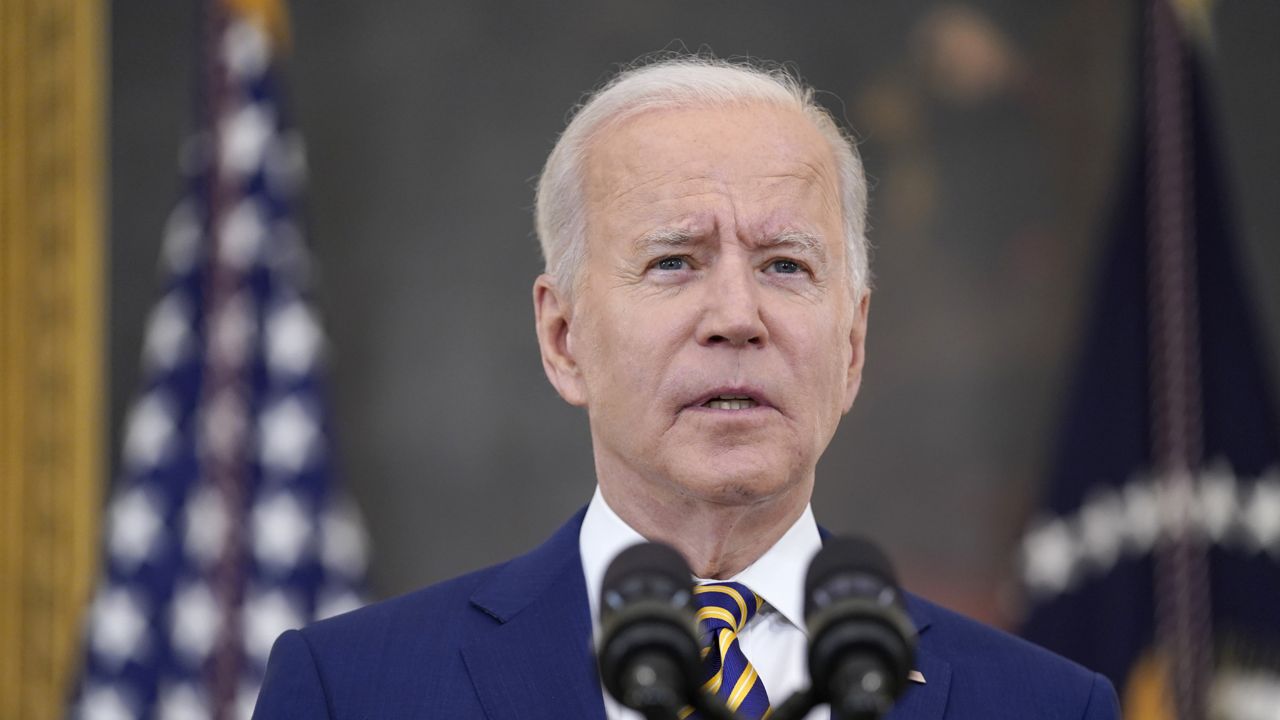President Joe Biden announced Friday that the United States has administered 300 million COVID-19 shots since he took office in January, celebrating the accomplishment while acknowledging there is still a long way to go in order to defeat the disease.
Reaching the 300 million milestone “did not happen on its own,” Biden said in an afternoon address from the White House, adding: “It took the ingenuity of American scientists and the full capacity of American companies and a whole-of-government response across federal, state, tribal, and local governments.”
“Above all, we got here because of the American people, stepping up and getting vaccinated,” Biden later said. “Helping family, friends, neighbors get vaccinated.”
As of Friday, the U.S. Centers for Disease Control and Prevention (CDC) says around 45% of all Americans are fully vaccinated against the disease, and nearly 53% have received at least one dose of a COVID-19 vaccine.
In early May, Biden announced a two-part goal in the fight against the virus. The president, in hopes of celebrating a return to normal on Independence Day, wants 70% of adults to receive at least one dose of a vaccine, and to have 160 million adults fully vaccinated by July 4.
With a little over two weeks until Independence Day, it appears increasingly unlikely that the country will reach either goal. Currently, 65% of adults have received at least one dose, while a little over 55% of adults — roughly equal to 142 million people — are fully vaccinated against the virus.
While it's true that COVID cases, deaths and hospitalizations have broadly decreased over the past month, so too has the pace of vaccinations. The average daily rate of vaccinations is now hovering around 1 million, a significant decrease from the height of daily vaccinations in mid-April, when nearly 3.4 million jabs were administered each day, per the CDC.
Biden spoke directly to those who have not been vaccinated, noting that experts are concerned that a new variant of COVID-19 will leave them even more vulnerable to severe illness.
“The new variant will leave unvaccinated people even more vulnerable than they were a month ago … because of what experts are calling the Delta variant,” Biden said. “It is a variant that is more easily transmissible, potentially deadlier, and particularly dangerous for young people.”
The variant, which was first detected in India, is believed to be 40% to 80% more transmissible than the Alpha strain that was first identified in the U.K. and eventually became the dominant strain both there and in the U.S. Delta is now the new dominant strain in Britain. In America, it accounts for about 10% of COVID-19 cases, but that’s up from 2.7% just three weeks ago.
Both Biden and top health officials in the administration are particularly concerned about states in the South, where lagging vaccination rates have started to push the amount of severe COVID cases back up.
When asked if he thought the Delta variant might force those states with lower vaccination rates back into lockdown, Biden said he does not think so — but warned that “some areas will be very hurt” by the more transmissible virus.
The administration is addressing vaccine equity and distribution in several ways, Biden noted Friday. Canvassers and volunteers will be out in full force across the country this weekend as part of the “National Month of Action” vaccination push the White House announced in early June.
And Vice President Kamala Harris has been touring the Southern states over the past several weeks in an effort to encourage Americans to get their jab. On Friday, Harris traveled to Atlanta, Georgia to tour a pop-up vaccination site in a state struggling to vaccinate its residents.
Georgia ranks in the bottom 10, per capita, for vaccinations, according to CDC data.
The president did not say one way or another if he thinks the United States will reach his goals by Independence Day, but he painted a hopeful picture for the months to come should vaccination rates increase.
“Kids are back to school and getting ready for the summer. People are going out to restaurants and traveling. Businesses are reopening,” Biden said. “Folks, we are heading into a very different summer compared to last year. A great summer. A summer of joy.”
Ongoing vaccine hesitancy remains a big challenge toward the administration's goals.
Edmund Haislmaier, a health care policy expert at the right-leaning Heritage Foundation, told Spectrum News that Biden should focus on on guaranteeing that all at-risk people get the vaccine, rather than on a specific percentage goal.
“The numerical goal of 70% of the population is less important than maybe the other sub goals like getting the elderly vaccinate," Haislmaier said. "We have achieved that goal.”
“The remaining population who have not yet received the vaccine, those people tend to be younger which means they are at much less risk of severe consequences if they do get the disease," Haislmaier continued in a criticism of the Biden administration's touted incentives for getting the vaccine. "And I’m not sure that we really need to be devoting a lot of effort to try and bully or bribe them into getting vaccinated.”
Earlier this week, the White House announced plans to host first responders, essential workers and military service members and their families on the South Lawn for a cookout and to watch the fireworks over the National Mall.
More than 1,000 guests are expected for what will be one of the largest events of Biden’s presidency.
The Associated Press contributed to this report.



